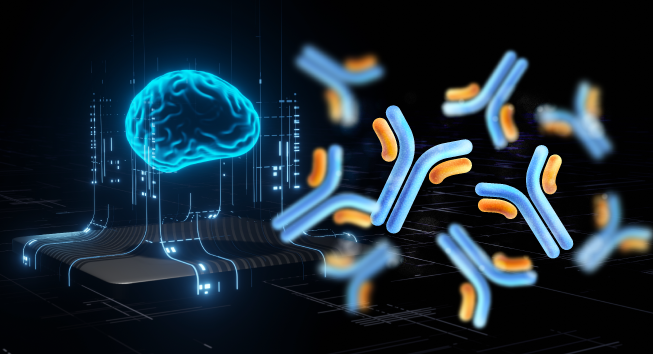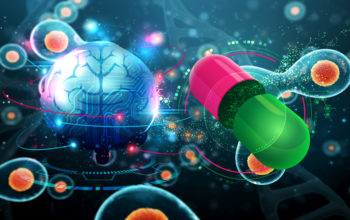
Date: 21st April 2021
The first monoclonal antibody was approved by the United States Food and Drug Administration (FDA) in 1986, and since then over 70 have been approved. The market for therapeutic antibodies has experienced an explosive growth, and they are now in use for a wide range of diseases such as cancer, autoimmune, metabolic and infectious diseases. However, time to market for these therapeutics is slow as optimisation is time consuming and demanding on resources. Now, researchers have now developed a machine learning (ML) method that supports the optimisation phase, helping to develop more effective antibody drugs.
Therapeutic antibodies are now an important class of drug however, the route to market is long, contains many processes, and the development phase is extremely costly. Once a target has been identified and an antigen has been generated, the antibodies that bind to the target are then identified. The process of optimisation can now begin, which is far from simple. Here, scientists use bioengineering to improve the properties of the antibody this can include for example antigen binding affinity and specificity, biological efficacy, pharmacokinetics and pharmacodynamics, and immunogenicity.
Traditionally, researchers start with an antibody lead candidate that has reasonable affinity with its target. Then random mutations are made to the gene encoding the antibody, which produces several thousand related antibody candidates. With automated process now available to determine which ones best bind the target, a lab can typically screen a few thousand candidates. This usually results in only a handful of antibodies passing to the next stage, and the attrition rate is high.
Now, researchers at ETH Zurich, Switzerland, led by Sai Reddy, have shown that optimised antibody variants can be identified by predicting antigen specificity via deep learning (DL) from a massively diverse space of antibody sequences. The team generated a model training dataset, generating about 40,000 related antibodies using a CRISPR mutation method, and screened libraries for binding. Using a well-established, commercial available antibody cancer drug, trastuzumab, they then used the ML algorithm to identify improved variants.
To generate the training dataset for the deep neural networks, the team deep-sequenced libraries of the therapeutic antibody trastuzumab, a monoclonal antibody used to treat breast cancer and stomach cancer that has been on the market for 20 years (sold under the Roche’s brand name Herceptin). They created around 40,000 variants via site-directed mutagenesis using CRISPR–Cas9-mediated homology-directed repair, which were expressed in a mammalian cell line. They then screened the libraries for specificity to human epidermal growth factor receptor 2 (HER2), the target for the antibody.
With the model now trained, they applied the neural networks to screen a computational library. This time it consisted of ~100 million potential trastuzumab variants. The algorithm predicted the HER2 specific subset, ~1 million, which was the further narrowed down with computer model that predicted how well they would meet additional drug development criteria such as viscosity, clearance, solubility and immunogenicity. This reduced the number of candidates to ~8,000 which were highly optimised lead candidates.
Discovery of improved antibodies
The team then wanted to characterise the properties of a selected group of these candidates, so they chose 30 at random, and went on to show that all of them retained specificity for HER2. In fact, several displayed improved binding compared with the original trastuzumab, and were easier to produce and were more stable. One new variant showed reduced immunogenic properties, which may make this variant better tolerated in the body.
Conclusions and future applications
The team here have shown that DL can be used to help optimise the development of antibody drugs, increasing the initial candidate pool to millions, which lead to the discovery of more active variants, with improved properties, which potentially have better tolerability in the body.
The ETH researchers are now looking to apply their ML method to optimise antibody drugs that are in clinical development. They are hoping it will lead to the development of more effective and cheaper to produce drugs, and that is will improve tolerability to these drugs. Whilst, trastuzumab only triggers a weak immune response, for many other drug candidates this is a real issue, and one that will benefit from such a tool.
With this in mind the Reddy lab have founded an ETH spin-off company, deepCDR Biologics, where they will leverage their deep learning methods with their propriety mammalian display process to partner biotech and pharma companies to develop and facilitate antibody engineering and optimisation.
This is a move that is more commonly being adopted by pioneering companies. With remarkable improvements in computational power coupled with advancements in artificial intelligence (AI) technology such methods are starting to transform the drug development process. We have recently seen Valence Discovery and Repare Therapeutics enter a drug discovery agreement, combing machine learning drug design with drug discovery. Global giants such as Microsoft teaming up with Novartis to revolutionise the future of drug development by combining advanced AI technology with deep life science expertise, or new start-ups like PercayAI entering a strategic commercial partnership with Canopy Biosciences. Machine learning models have been designed to accurately predict how combinations of different cancer drugs can kill various types of cancer, and can now even solve protein structures.
Such technologies and companies, that are the forefront of innovation, will hope that AI-powered strategies will accelerate life changing research and drug development, creating more effective and efficient medications and drugs.
For more information please see the press release from ETH Zurich
Mason, D.M., Friedensohn, S., Weber, C.R., Jordi, C., Wagner, B., Meng, S.M., Ehling, R.A., Bonati, L., Dahinden, J., Gainza, P., et al. (2021). Optimization of therapeutic antibodies by predicting antigen specificity from antibody sequence via deep learning. Nature Biomedical Engineering.
https://doi.org/10.1038/s41551-021-00699-9
